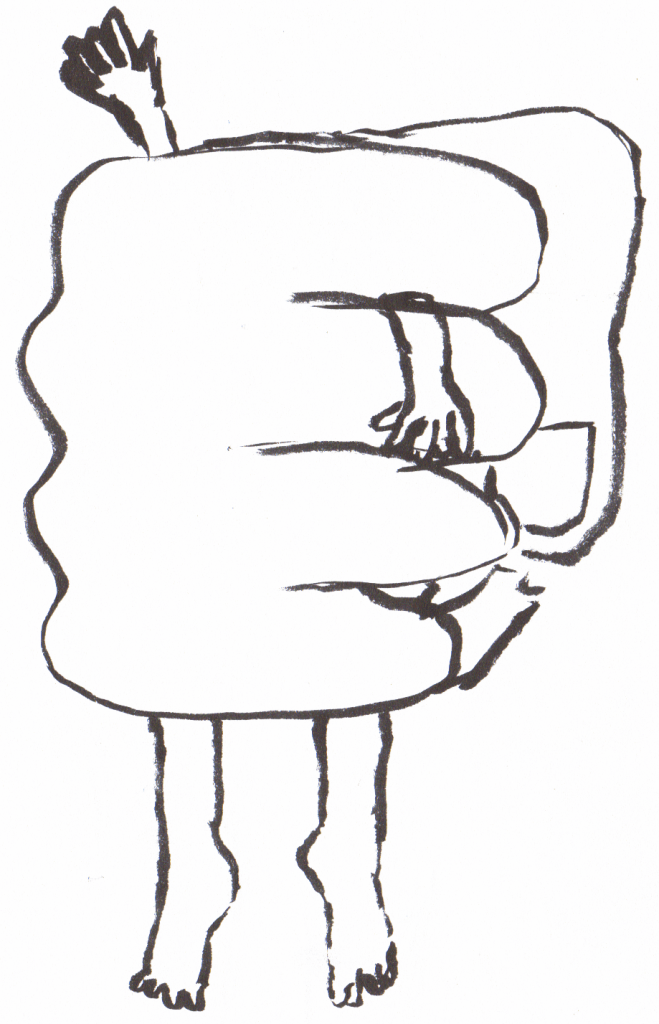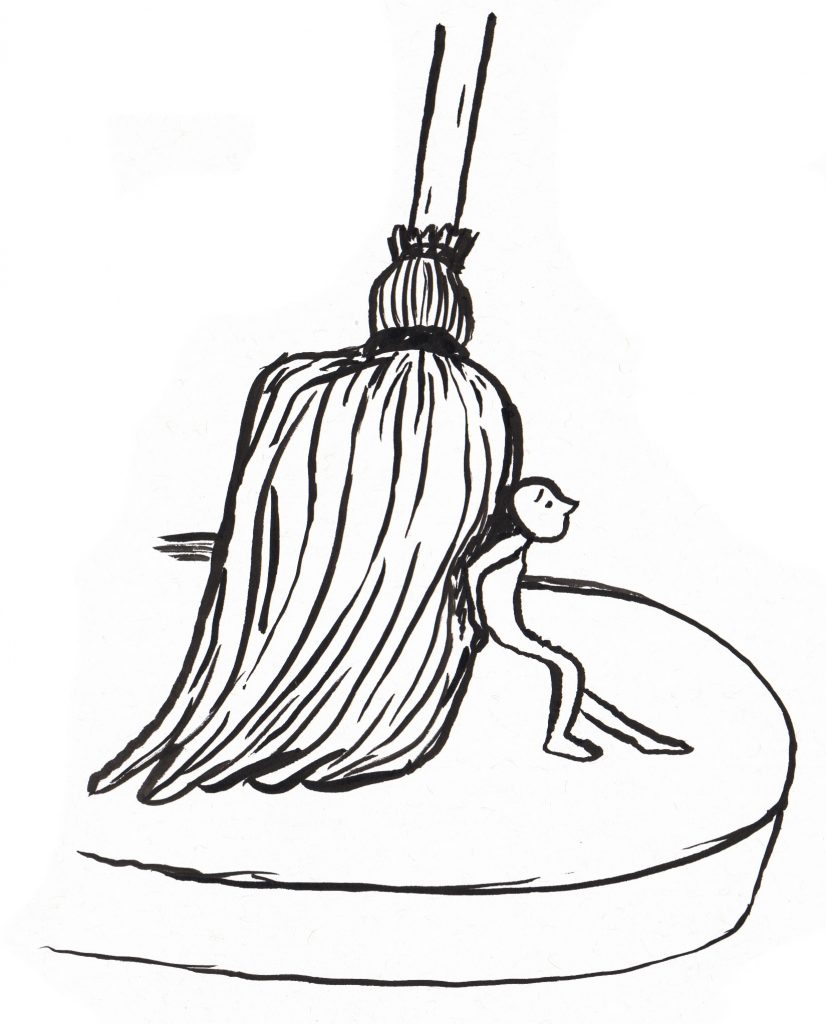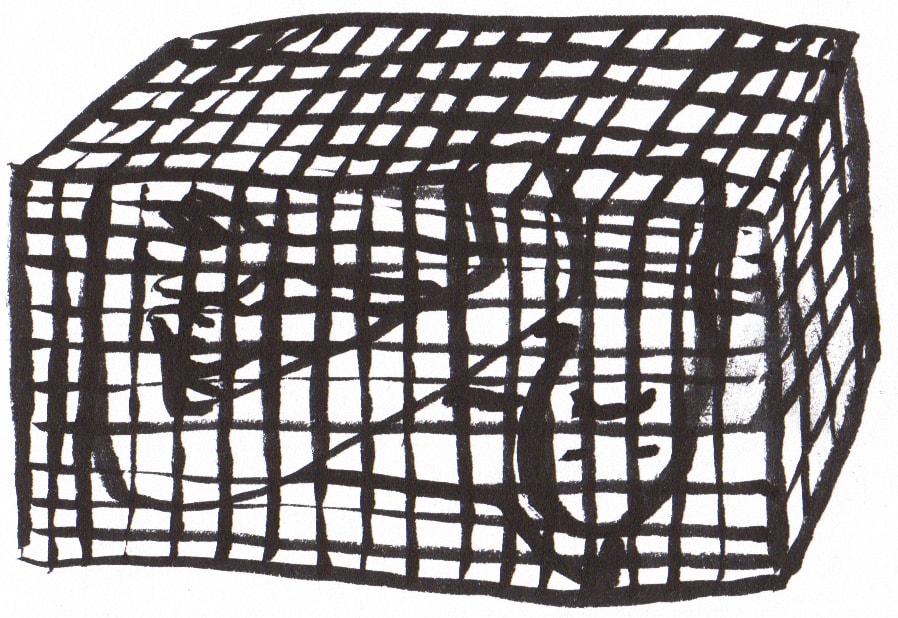The following interview took place in the Bässlergut deportation prison during the official visiting hours. Standing in front of the large prison gates, we press a red button and via intercom give the names of the people we want to visit. The first door opens; before being allowed through the second we have to wait again; ultimately, we are let in and after a few metres we enter the overheated entrance area of Bässlergut. Take off the winter jacket, hand in the ID-card, deposit our bags, fill in the registration form, go through the turnstile and pass the metal detector. As always, we are taken one-by-one to the visitors’ room where we take our seats and wait until finally, we are five of us at the table. Although we all already know each other, the two detainees we’ll be interviewing are rather mistrustful at first. They show this by not only wanting to know why we wish to interview them but also who we work for and whether we are affiliated to any (political) group or association. The interview is very risky for the two detainees, as they are subject to the capriciousness of the wardens. Recognising this, we would like once again to thank both for allowing us to publish our conversation.
You‘re about to have a level 1 deportation.1 Will you resist this?
B: Yes, I‘m being subjected to a Level 1 deportation. I can’t cope with going through all the levels again and then getting kicked out a third time so violently. No, I really don’t want that. I don’t know, when exactly I will be deported. I will only hear about 2 to 3 days beforehand. It doesn’t bring much to resist anyway; it would only defer the deportation by 2 to 3 weeks.
N: The problem is that we are just seen as foreigners. That we’re also humans gets forgotten.
B: I grew up here and now I‘m being deported and can’t stay with my child. What I really want is to live here, look after my family and see my child grow up! Actually, I never wanted to put kids onto this fucking world. But now I have one and have to leave. I won’t be able to see how he develops, how he eats, speaks or walks for the first time.
What’s your everyday life look like here in Bässlergut?
B: At 7:15 the guards open the door to our cell and at 17:00 it’s closed again. There are three of us living in our cell. We have a TV there. In addition, there’s a common room on our floor with a kitchen and a large table, but only two chairs. It’s not cosy there at all.
N: Being able to go out helps the time pass. Some go out, a few stay inside. Twice a day we can go into the courtyard, once for an hour and once for two hours.
What about the food?
B: Breakfast is at 7:15 and we have something to eat again at 11:00 and at 17:00. Second-helpings are out. Once we asked the guards if we could order a pizza and pay for it ourselves. „Fuck you,“ was the answer.
 N: A small kiosk is open once a week where we can buy food, drinks, cigarettes and other things. But they are completely overpriced: An M-budget chocolate bar costs about Fr. 2.00.
N: A small kiosk is open once a week where we can buy food, drinks, cigarettes and other things. But they are completely overpriced: An M-budget chocolate bar costs about Fr. 2.00.
B: I work 2½ hours a day and can hardly buy anything with what I earn!
And what about the work?
N: In the evening, the prison wardens come and ask who wants to work the next day. On Monday, Wednesday and Thursday the working hours are from 8:00 to 10:30 and on Tuesday and Friday from 14:00 to 16:30.
B: Two to three people sit at each work-table. We are not allowed to talk. You can only drink water from a tap in the toilet. We’re not allowed to drink water while working.
What sort of work do you do?
B: At the moment, we’re mainly doing things for Christmas, for example, assembling different packages and gluing pieces together. When they’re finished, the packages are then sent to Belgium, where they are filled with various things. From there they go on to China. But I don’t know who the order is for.
N: For the two and a half hours we work we get Fr. 7.50 each.
B: Last week my wife and child came to visit me when I was working. At the reception they asked to see me, but nobody came to tell me that my family was here. So, they left again. When later I found this out later, I asked the guard why he hadn’t informed me. Seeing my wife and child is more important to me than shitty Fr.7.50! „Those are the rules: When you agree to work you have to work.“ was the answer I got.
N: Withdrawing the allowance to work is sometimes used as a form of punishment as this means you aren’t able to earn any money.
Do you work?
B: Yes, I work regularly. But not because of the money. No, the only reason I work is that I sometimes need to get some peace. Otherwise all around me people are always listening to music, talking on the phone or talking to other people. By going to work, I can escape the hubbub for a short period of time.
N: No, I don’t work anymore. Three months ago, I broke a small carton box while working. It was only about as big as an A4-sized page …
B: That can happen; it‘s all happened to all of us some time!
N: … I got bunker-arrest for five days. I haven’t worked since then. I don’t want to risk having to go there again.
Can you tell us something about the bunker? What’s it like?
N: It’s an isolation cell used for solitary confinement. In my case, for breaking a small cardboard box at work. During the time in the bunker I was only allowed to walk in the courtyard once a day and on my own; the rest of the time I spent isolated in a room with a small window and a TV. After five days, I was finally able to return to my cell.
 What kind of medical care do you have?
What kind of medical care do you have?
B: There are two doctors you can go to. One is not helpful at all. He treats us aggressively. We speak different languages which often leads to misunderstandings. We are as unimportant to them as we are to the guards. You can tell by how they talk to you and how they deal with you in general. One detainee in our cell swallowed a lot of shampoo once. He had mental problems and hadn’t eaten for a long time, but he smoked like a chimney. Do you think the guards arrived straight away when we called for help? No way, they only got here after three-quarters of an hour, although they could have made it in five minutes. That shows how we aren’t taken seriously here.
N: Two weeks ago, I asked the psychiatrist who treated me two years ago, to come over because I wasn’t well. However, the prison guards told me that this wouldn’t be possible and that I wasn’t even allowed to ask.
Walking past the turnstile to the visitors‘ room, one can see on the right-hand side a cupboard full of various medicines. Do you get the medication you need? And what medicines do you get?
B: Yes, we can get medication. All the medicines we take have already been dissolved in water. It isn’t possible to get medication in the original packaging. I bet there‘s Temesta in it as well. When I asked if I could get my medicine in its original packaging, I was told, „Shut up, you shit foreigner.“ Since then, I have stopped taking medicines because I see what happens to everyone else: either they calm down and sleep or they become aggressive. By the way, the same thing happens after dinner: We all go to sleep afterwards. That‘s not normal! Or do you go to sleep every time you eat? There is certainly some sort of tranquilizer in the food.
How do you get on with each other?
B: We spend most of the time on our own – each of us in our own part of the cell. Everyone tries to cope with their problems by themselves. Especially if someone has been badly treated, then he can become very aggressive. Then it is better to leave him alone for the time being. Added to that, we have difficulties communicating with each other, as we speak so many different languages.
Are there any collective forms of resistance?
B: Once somebody went on a hunger strike for seven days. Then the guards put him in the bunker and gave him some medication. Even in our cell, we’ve thought a few times about going on a joint hunger- or work-strike and we already started planning one once. But there are always a few detainees who don’t want to join in. I can understand that too: If you smoke, you just need to go to work. That‘s why such plans to resist fail.
N: Actually, one could say that the only way to survive here is to try to stay stable. Because they want that: to break us mentally.
Do you feel any solidarity from outside the walls of Bässlergut?
B: No; and, if so, then only through visits from outside. Anyone who doesn’t have any visitors doesn’t feel any solidarity. Once you‘re in jail, you‘re stigmatised, you don’t have any friends any longer. When you‘re in jail, suddenly all your friends are gone and nobody comes to visit you. That‘s the way it is…
Gegen wen richtet sich eure Wut?
N: When I was outside, I didn’t know what the deportation prison is like. Now I‘ve been here for four months. What’s done here to people, doesn’t happen anywhere else. If I ever get out, I’ll come back to Switzerland and demolish this prison. Since being here this has become my goal.
B: As a foreigner, you can do little to change your situation. Even if you‘re born here and have a Swiss passport, you‘ll always be a foreigner. This Blocher, who earns millions every year and stirs up resentment against foreigners. Who works for him? Who cleans his toilet? And he says “shit foreigners”! In this world, the mightier one always wins. That’s reality. Switzerland is said to be neutral. But who supplies weapons to the rest of the world? Switzerland is said to be neutral. But that‘s just not true. Switzerland is a police state. Once the prosecution has decided what’s going to happen to you, it’s closing time. Is your lawyer a member of the SVP? Then it’s closing time. They can offend us foreigners as much and as often as they want. We’re here and just have to shut up.